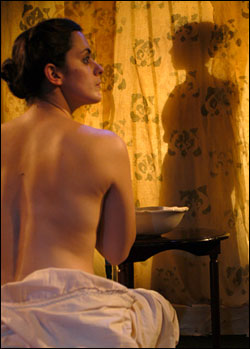THE YELLOW WALLPAPER
Theater Schmeater, 1500 Summit Ave., 206-325-6500. $12-$15; Pay-what-you-can Thurs.
8 p.m. Thurs.-Sat. Also 2 p.m. Sun., April 13. Ends Sat., April 26.
Heather Newman’s adaptation of Charlotte Perkins Gilman’s semiautobiographical 19th-century short story is primed for melodramatic overload. The tale concerns an outspoken feminist author and new mother having a woeful case of then-undiagnosed postpartum depression; she loses her mind completely when her ill-advised husband follows doctors orders and demands she give up writing to “rest” in a grim room with the titular interior decoration. We all know how self-indulgently feverish the results could have been; but, compellingly, they aren’t.
Part of this is due to Mary Jane Gibson, who anchors a strong ensemble. Her Charlotte is alive at every second, with wide, wary eyes darting through a completely convincing mental debilitation. She’s matched by Stephen Loch, emphatically avoiding caricature as her well-meaning husband, and, particularly, by Annie Lareau, in a deft, shaded turn as spinsterish sister-in-law Jennie.
Charlotte’s obsessive monologues are overwritten, and the show is paced in an episodic manner that leaves the ending feeling terribly abrupt. But, aside from some masked wallpaper demons that seem to have drifted in from another production, Newman’s direction has remarkable subtlety (though an over-the-top James Catechi, as a smug doctor, seems to be playing to the balcony that doesn’t exist). She orchestrates a complex, understated conflict beneath each relationship here. When Charlotte calls sexist Jennie “sister” after being forced to hand over both pen and paper, it sounds like both a political remonstration and a final plea for help. STEVE WIECKING
THE LAST NIGHT OF BALLYHOO
Taproot Theatre, 204 N. 85th St., 206-781-9707. $10-$26.
7:30 p.m. Wed.-Thurs.; 8 p.m. Fri.- Sat.; 2 p.m. matinees Sat. Ends Sat., April 26.
Taproot Theater often leans toward wholesome, life-affirming entertainment, and the result is sometimes a bit cautious and polite for my tastes. This time around, I have no quibbles. Alfred Uhry’s Tony-winning play isn’t quite as sturdily constructed as his Driving Miss Daisy, but it’s more affecting. And Taproot’s production is well acted by a perfectly chosen cast, directed with confidence (if not quite with flair), and, yes, is unusually life-affirming.
Like Daisy before it, the play delves into the demimonde of Southern Jewish society, a world where the ingrained prejudices of Atlanta’s established Jewish community against blacks, “Yankee Jews,” and otherswere the direct result of intense self-loathing. Uhry sets the action in late 1939, when Gone With the Wind premieres to sell-out crowds, Germany commences its terrifying campaign in Eastern Europe, and Jewish teenagers from all over the South gather for a three-day meet-and-greet called Ballyhoo. Our two young heroines must decide whom to take, what to wear, and how to forget that Jews are dying by the millions half a world away.
It’s a little unfair to single out anyone in the uniformly excellent cast, but I was especially taken with Aaron Roos, who plays a nice Jewish kid from Brooklyna stranger to the relentless gentility of Southern society. And Shellie Shulkin, who was a highlight in Second Story Rep’s Glass Menagerie, seems to be cornering the market on insane Southern matrons. But, look, you get the idea: They’re all greatgo see it. CHRIS JENSEN
THE SPEED OF DARKNESS
Velocity Dance Studio, 915 E. Pine, second floor, 206-325-6500. $15; pay-what-you-can
Thurs. 8 p.m. Thurs.-Sat.; 7 p.m. Sun. Ends Sun., April 27.
The Velocity studio isn’t such a good place for traditional theater: With polished dance floor and lack of wing space, it doesn’t lend itself to realism. And accomplished set designer Etta Lilienthal either hasn’t sufficiently used or wasn’t given a manageable low budget for this production of Steve Tesich’s heartbreaking, late-’80s socio-political contemplation. The stiffening physical production (lacking even sufficient props) is so full of hard-backed chairs that the actors seem dying to collapse on the couch that isn’t there. Lucky thing for us they don’t let it stop them from delivering the goods.
Director Jerri Lee Young’s presentational blocking doesn’t help matters, but she’s done something right because there isn’t a bad performance in the lot.
In this newly relevant work about the effects of war in the very roots of our country, every actor is filled with a compassion that stays human and never gets squishy with sentiment. Playing Joe, a family man and furtively tormented Vietnam vet who has just been nominated for a public service award, Jim Hatch is an instantly familiar big lug of a middle-aged guyhe’s only playing two notes, but damn if those notes don’t add up to something bigger, anyway.
Others are even better. Paul Klein is a hushed symphony of disillusionment as Lou, a former-‘Nam-buddy-turned-drifter who shows up to remind Joe of several regrets that should never have been buried. It’s a fairly majestic portrayal of a half-cracked soul still filled with longing, and a quietly raging personification of Tesich’s understanding of the creeping terror behind American complacency. S.W.




